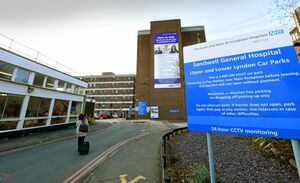Plan to tackle 'low morale' in maternity services due to lack of staffing
A midwife recruitment and retention plan is being driven by hospital chiefs to tackle a lack of staff which, a health watchdog says, is causing “very low morale”.

Last month the Care Quality Commission made a two-day unannounced visit to maternity services at Sandwell and West Birmingham Hospitals NHS Trust and although no immediate concerns were raised, feedback from inspectors noted a lack of midwives to meet the needs of women and babies in the service.
“This negatively affected well-being and presented a potential risk to patient safety,” said the CQC.
“This was particularly evident amongst community midwives where morale was very low.”
The watchdog found that the care, treatment and support of women was good and the senior leadership team understood the challenges to quality and sustainability and had action plans to address areas of risk.
“However, midwifery staff did not all feel supported, respected or valued by the senior management team,” said the CQC.

A report to a public meeting of Sandwell and West Birmingham Hospitals NHS Trust Board on Wednesday detailed the challenges faced by hospitals through the lack of available maternity staff.
“We should aim for creative workforce design backed by excellent multi-disciplinary training and education to enable teams to work together to provide safe services,” said the report.
“In maternity, workforce planning poses a unique set of problems.
“Each care ‘episode’ spans about 40 weeks, crosses hospital and community settings, and involves scheduled appointments.
“Many pregnancies need extra unscheduled care, often involving more scans or other procedures as well as an unexpected inpatient admission in addition to the birth itself.
“The birth can be at home, in a midwifery-led unit or obstetric unit in an acute hospital.
“It is also necessary to consider risk escalation and transfer of women in labour between low and high risk settings when planning the workforce.”
Staffing levels
Safe staffing levels in the delivery suite at Birmingham’s City Hospital’s maternity unit are set at 10 qualified staff round the clock. In March the “fill rate” was 90 per cent and in April and May it was 95 per cent.
The report stated that community midwifery has seen many changes and the trust serves "a complex and diverse population” which has impacted on retention and recruitment.
The trust gives expectant mothers “continuity of care”, where they are looked after throughout pregnancy by the same staff, in an effort to improve their experience.
Balwinder Kataria, who gave birth at City Hospital on February 25 told the trust board meeting that she suffers from anxiety.
“I wanted the same midwife - to build a relationship with one person was very important to me,” she said.
“The nurses were so caring and compassionate. I would do it all over again if I could have the same team of staff.”
The report said a “robust recruitment and retention plan” has been developed which includes a number of incentives for both new starters and existing staff in hard to fill areas.
Sir David Nicholson, chairman of the trust, said: “We should not underestimate the difficulties our staff are feeling at the moment.
“The whole ‘continuity of care’ is a major change in the way people do their work on a daily basis.
“This is a fundamental change and we need to make sure we are putting the resources in place to make it happen.
“Regular communication is really important to keep maternity on our priority list going forward.”





